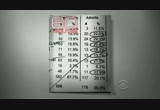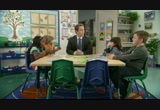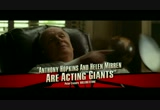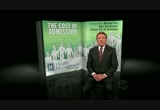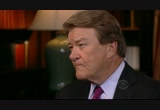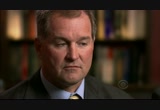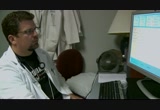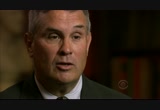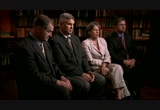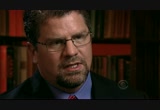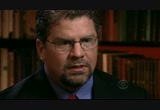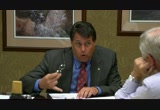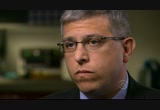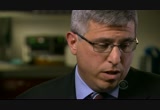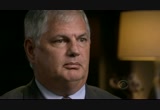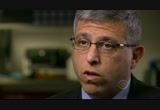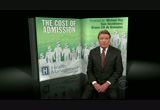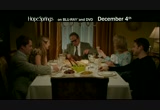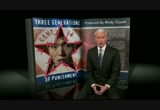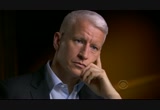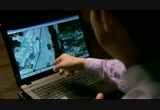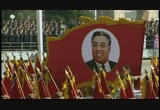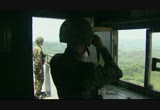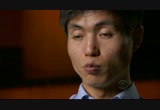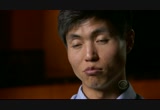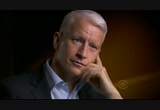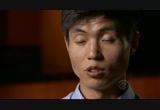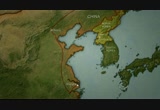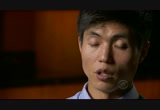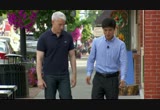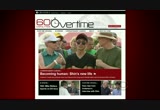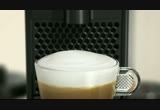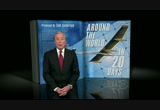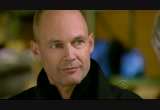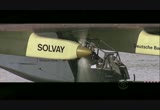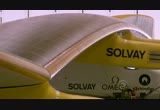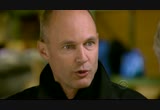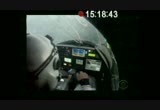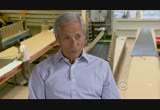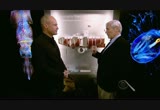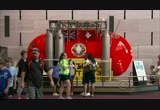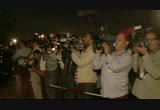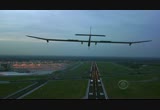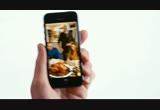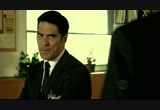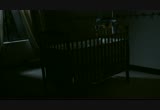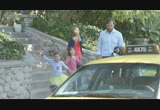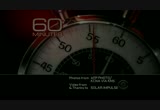tv 60 Minutes CBS December 2, 2012 7:00pm-8:00pm PST
7:00 pm
hospital chains that they had been pressured to admit patients, regardless of medical need, to increase revenues. >> this is coming from a non- physician, somebody who never went to medical school, never seen or treated a patient is telling the physician how they should be taking care of patient and making decisions related to a patient. and my blood pressure is going up just saying this. >> cooper: camp 14 was all that shin dong-hyuk says he knew for the first 23 years of his life. 15,000 people are believed to be imprisoned here, surrounded by an electrified fence. did anybody ever explain to you why you were in a camp? >> ( translated ): no, never. because i was born there, i just thought those people who carried guns were born to carry guns, and prisoners like me were born as prisoners. >> "solar impulse," you are cleared to proceed. have a good flight. >> simon: two swiss gentlemen
7:01 pm
have built a plane which they hope to fly across the united states next spring, and then around the world, without burning an ounce of fuel. the plane is called "solar impulse," and it's powered entirely by the sun. it's not the first solar airplane, but it is the first that can fly at night. >> four, three, two, one. go! we made it! we made it! >> i'm steve kroft. >> i'm leslie stahl. >> i'm bob simon. >> i'm lara logan. >> i'm anderson cooper. >> i'm scott pelley. those stories tonight on "60 minutes." tdd#: 1-800-345-50e d. llover your old 50 find new wa0 so if 50 tdd#: 1-800-345-50u can receivep
7:02 pm
llover your old 50 find new wa0 so if 50 it [ all kids ] faster! ok, what's fast? um, my mom's car and a cheetah. okay. a spaceship. a spaceship. and what's slow? my grandma's slow. would you like it better if she was fast? i bet she would like it if she was fast. hm, maybe give her some turbo boosters. tape a cheetah to her back. tape a cheetah to her back? seems like you have thought about this before. [ male announcer ] it's not complicated. faster is better. and the iphone 5 downloads fastest on at&t 4g. ♪ all the plastic water bottles we use in a year can add up.. how's the run? but 300 of them can be replaced with just one brita filter. it was good. thanks. brita. filter for good.
7:03 pm
♪ ♪ [ male announcer ] 'tis the season to discover the kid in all of us. the memories that last, start with the gifts that last. ♪ enjoy free shipping and great values on your holiday shopping from l.l.bean. starts with ground beef, unions, and peppers baked in a ketchup glaze with savory gravy and mashed russet potatoes. what makes stouffer's meatloaf best of all? that moment you enjoy it at home. stouffer's. let's fix dinner. that moment you enjoy it at home. one is for a clean, wedomestic energy future that puts us in control. our abundant natural gas is already saving us money, producing cleaner electricity, putting us to work here in america and supporting wind and solar. though all energy development comes with some risk,
7:04 pm
7:05 pm
>> kroft: if you want to know why health care costs so much in this country, consider this-- it's estimated that $210 billion a year, about 10% of all health expenditures, goes towards unnecessary tests and treatments, and a big chunk of that comes right out of the pockets of american taxpayers in the form of medicare and medicaid payments. for more than a year, we have been looking into the admission and billing practices of health management associates. it's the fourth largest for- profit hospital chain in the country, with revenues of $5.8 billion last year, and nearly half of that coming from medicare and medicaid programs. we talked to more than 100 current and former employees, and we heard a similar story over and over-- that h.m.a. relentlessly pressured its doctors to admit more and more patients, regardless of medical need, in order to increase revenues.
7:06 pm
health management associates owns 70 hospitals in 15 states. it's thrived buying small, struggling hospitals in non- urban areas, turning them into profit centers by filling empty beds. generally speaking, the more patients a hospital admits, the more money it can make, a business strategy that h.m.a. has aggressively pursued. did you feel the hospital was putting pressure on doctors to admit people? >> nancy alford: yes. >> kroft: for what reason? >> alford: money. >> kroft: you're sure of that? >> alford: uh-huh. >> kroft: until she was fired, nancy alford was the director of case management at the h.m.a. hospital in mesquite, texas, where she oversaw the auditing of patient records and signed off on the accuracy of bills sent to medicare and medicaid. she'd never met former h.m.a. doctors jeff hamby, cliff cloonan, and scott rankin until we brought them together in new york to discuss their
7:07 pm
experiences at h.m.a. >> scott rankin: what's really remarkable is, we're from very different areas of the country, yet the pressures placed upon the emergency physicians and the mechanism in place to enforce those procedures and policies-- exactly the same. >> kroft: cliff cloonan is a retired colonel who spent 21 years as an army doctor before joining the carlisle regional medical center in pennsylvania as the assistant emergency room director. dr. scott rankin worked in the same department. both say they were told by h.m.a. and its e.r. staffing contractor, emcare, that if they didn't start admitting more patients to the hospital, they would lose their jobs. >> cliff cloonan: my department chief said, "we will admit 20% of our patients or somebody's going to get fired." >> kroft: what's wrong with admitting 20%? >> rankin: in a relatively rural, limited-resource community hospital, your admission rate out of the emergency department, somewhere in the neighborhood of 10%. >> kroft: and they wanted 20%? >> rankin: correct. they wanted 20%.
7:08 pm
>> cloonan: there's no way you can do that and not have it be fraudulent, because you're not admitting on the basis of medical requirements, you're basing it... it on strictly an arbitrary number that has been pulled out. >> kroft: all sorts of businesses set quotas. what's wrong with this? >> rankin: we're not building widgets. we're taking care of patients who are ill and come in to the emergency department. >> kroft: jeff hamby was an emergency room doctor at h.m.a.'s summit medical center in northwest arkansas. he says he was fired for not meeting admission targets and is suing h.m.a. for wrongful termination. h.m.a. maintains no one has ever been fired over admission numbers. hamby called the targets "coercion to commit fraud." >> jeff hamby: initially, it was 15%. they kept trying to up it. >> kroft: they didn't care how you got there? they just wanted you... >> hamby: wanted us to hit the benchmark, arbitrary benchmark. >> kroft: they're saying, "you will admit these people, whether they're sick or not, whether they need to be hospitalized?" >> hamby: correct >> alford: uh-huh. >> cloonan: they never phrase it that way. they did say "admit 20%."
7:09 pm
the reality of that is that there's only one way that that can happen, and that is if it is arbitrary. that is, if you do admit patients that don't need to be admitted. >> rankin: for patients who were 65 and over, the benchmark was 50%. >> kroft: those would be medicare patients? >> rankin: correct. >> kroft: you're saying it's not a good idea to admit half the patients over 65? >> cloonan: if you are put into the hospital for reasons other than a good, justifiable medical reason, it puts you at significant risk for hospital- acquired infections and what we would refer to as "medical misadventures." >> kroft: these stories are echoed in many of the thousands of documents we examined, including emails like this one from a hospital executive in durant, oklahoma, pressuring her staff during emergency room shifts. "only 14 admits so far! act accordingly..." and this e-mail from an e.r.
7:10 pm
director at an h.m.a. hospital in south carolina to a new emergency room doctor. "every time a 65-year-old or older comes in, i am already thinking, 'do they have some condition i can admit them for?'" "we are under constant scrutiny. i will be blunt, i have been told to replace you if your numbers do not improve." in your dealings with h.m.a., did you ever get any sense that this was commercially driven? >> hamby: of course. i cant imagine any other explanation to admit a percentage. >> alford: the administrators said that daily, frequently. "you know, we don't make any money if we do this. we make more money if we do that." >> kroft: admit more patients? >> alford: admit more patients, keep them longer. money was the chief motivator. >> kroft: you're all saying this was codified, institutionalized at h.m.a.? >> rankin: absolutely, this was... this was a well thought- out plan. it even relates to how they had control over us as emergency physicians. >> kroft: that control, they say, was exerted with corporate- wide computer software called
7:11 pm
promed which was installed in every emergency room. h.m.a. says it was designed and approved by medical experts to improve the quality of patient care. but doctors, nurses, emergency room directors, and hospital administrators told us that h.m.a. customized the program to automatically order an extensive battery of tests, many of them unnecessary, as soon as a patient walked into the emergency room. >> hamby: the minute the chief complaint and their age was placed into that computer, that system ordered a battery of tests that was already predetermined. >> rankin: this was prior to being seen by the treating physician. and we would look at the chart and say, "why was all this ordered?" >> kroft: the computer program also generated printed reports like this one, evaluating each doctor's performance and productivity. on this document, the doctors who hit corporate admissions goals received praise from company managers; those who didn't knew it. >> cloonan: the primary purpose of the scorecard was to track
7:12 pm
how you were doing in terms of revenue generation, based on number of tests ordered and number of patients admitted to the hospital. >> rankin: it has nothing to do with patient safety and patient care. it has everything to do with generating revenues. >> kroft: they say that when a doctor decided to send an emergency room patient home, the computer would often intervene, prompting the doctor to reconsider. >> hamby: the minute i hit "home," it says, "qual check." and then it comes up with a warning: "this patient meets criteria for admission. do you want to override?" >> kroft: what was the reaction from the administrators if you overrode the computer? >> hamby: it was like being called to the principal's office. >> cloonan: mind you, this is coming from a non-physician, somebody who never went to medical school, never did a residency-- frankly, has never seen or treated a patient-- is telling a physician how they should be taking care of a patient and making decisions related to a patient. and my blood pressure's going up just saying this. >> kroft: in august, a former executive vice president of the hospital chain, john vollmer,
7:13 pm
testified under oath in a deposition that h.m.a.'s aggressive admission policies came directly from the top, c.e.o. gary newsome. >> john vollmer: mr. newsome's thought was that an average of 16% was accomplishable at all hospitals or more, and we should seek to do that and make that happen. >> kroft: vollmer, who was also fired by h.m.a., became angry when the company lawyers challenged him. >> vollmer: i did my duty by informing h.m.a. that what they are doing is wrong. you can't require them all to have 16% admission rates, and beat up doctors and administrators and all these folks over it when you are doing it to increase your revenue for the facility. >> i'm going to move to strike what you just said. >> kroft: we wanted to talk with gary newsome, health management associate's c.e.o., but instead, we were given h.m.a. executive
7:14 pm
vice president alan levine, who joined the company just two years ago. levine says the allegations are coming from disgruntled employees. and if they were true, he said, it would be reflected in the admissions data. he says admission rates haven't changed in four years, and are near or below industry averages. the allegations have to do with you taking people who shouldn't be admitted to the hospital and putting them in the hospital. >> alan levine: those allegations are absolutely wrong. >> kroft: h.m.a. doesn't set quotas for hospital admissions. >> levine: no. >> kroft: h.m.a. never told emergency rooms that they needed to admit a certain percentage of people that came in? >> levine: we tell them collaboratively that our goal is to make sure the patient gets in the right setting. it... we don't want a patient going home that should be admitted. we don't want a patient admitted that shouldn't be admitted. >> kroft: i've got some documents here from durant, oklahoma. we showed levine this physician performance review from the h.m.a. hospital in durant, oklahoma, which had been given
7:15 pm
to us by a doctor there. it prominently shows an admission goal of 20%. it says there on the right hand side, "goal, 20%." and it shows the lights. the reds show people who are not actually meeting their goal. >> levine: well, first of all, i've never seen this document, so i can't... i mean, you... the... i can tell you right now, as a company... well, there's a lot of things on this form, steve. we look at testing guidelines. there's a lot of quality metrics on here, steve. we measure all of this stuff... >> kroft: yeah, but there... we have here one whole column, "goal." >> levine: that's not... >> kroft: "goal." >> levine: that's not... that's not from our company, steve. i don't know where that came from. >> kroft: it's not from your company? it's... i don't... one of your hospitals. >> levine: steve, we don't have any kind of goals. i don't know what the percent admissions are at that hospital. maybe they are actually 20%, but the... the admissions goal at any hospital is driven only by what the normal trend is for that hospital. >> kroft: we talked to a hundred people who say that there was pressure from the corporate
7:16 pm
level to admit people. are they all lying? >> levine: steve, we have one goal. and... and... and i'm not going to... i'm not... i'm not going to judge anybody else. our goal is... i... each and every patient that comes into the hospital is a unique and special circumstance. >> kroft: hardly anyone we talked to complained about the quality of care at h.m.a. hospitals, only the quantity of care. and we were not the first to raise the subject of inappropriate admissions with corporate executives. paul meyer raised the allegations several years ago. at the time, he was director of compliance with h.m.a., charged with inspecting and auditing its hospitals to make sure they were following state and federal laws. meyer is a former 30-year veteran of the f.b.i., whose last assignment had been supervising medicare fraud in miami before he joined h.m.a. h.m.a. has said that their
7:17 pm
admission policies are designed to improve the quality of care for the patients. do you believe that? >> paul meyer: based on my experience, i... i can't believe it. >> kroft: what do you think they're based on? >> meyer: i think they're based on profit. >> kroft: meyer says he reached that conclusion in 2010 after hearing complaints from emergency room doctors, case workers, and hospital administrators. they said they were being pressured to fill beds with people who did not need to be admitted to the hospital. meyer says he audited four hospitals in texas, florida, and oklahoma, and concluded that h.m.a. had intentionally billed medicare and medicaid for hundreds of thousand of dollars in inappropriate hospital stays that did not meet government standards for admission or reimbursement. did you think it was medicare fraud? >> meyer: yes. it was medicare fraud. simple as that. >> kroft: why was it medicare fraud? >> meyer: they're submitting bills to the government for the admission of patients.
7:18 pm
the patients didn't meet the appropriate prescribed criteria for admission and for the hospitals to bill medicare for the admissions. it's... it's a... a false billing, if you will. >> kroft: if you'd been at the fbi and somebody came in and handed you all of this stuff, would you have pursued a criminal investigation? >> meyer: yes. no doubt about it. >> kroft: meyer says he told the same thing to corporate officials and wrote up his findings in three memos to top management. >> meyer: i made sure that i spoke with the c.e.o. face to face about this, that something is really, really wrong, and it's got to be addressed. i had indicated that "if it's not addressed by you all, then i'll have to handle it getting addressed by the government." >> kroft: what was their response? >> meyer: had another job change. >> kroft: meyer says hma's corporate attorneys heavily edited his reports and instructed him to destroy the original version of his memos, but he never did. >> meyer: i felt it was evidence.
7:19 pm
these people are changing my write-up of what i found, softening it up, excising out things, labeling it as attorney/client privilege when it wasn't. and i felt certain they're trying to cover this up. >> kroft: he was eventually fired and is now suing h.m.a. for wrongful termination. what are we supposed to make of... of these allegations that have been raised by... by paul meyer? he says this company's guilty of medicare fraud. >> levine: well, we'll let... we'll let the proper authorities be the judge of that. okay, we feel that we are doing the right thing for our patients. it's not mr. meyer's place to decide guilt or innocence. we investigate anything that's reported. and if we find a problem, we... we fix it. >> kroft: are you saying that paul meyer doesn't recognize medicare fraud when he sees it? >> levine: i think his assertions were not accurate. i think he provided incomplete information in the course of doing his own investigations. but it... at the end of the day, i'm not going to question mr. meyer. our goal is to get it right.
7:20 pm
>> kroft: h.m.a. says it hired an outside law firm to investigate meyer's allegations, and that there was no finding that would support an allegation of fraud, adding that any overpayments from medicare and medicaid were rectified. but paul meyer is the least of h.m.a.'s problems right now. the hospital chain is currently under investigation by the justice department, which has subpoenaed records pertaining to the management of its emergency rooms and its computer software program, promed, which h.m.a. has stopped using. the hospital chain says it is cooperating fully with the investigation and has nothing to hide. i had enough of feeling embarrassed about my skin. [ designer ] enough of just covering up my moderate to severe plaque psoriasis. i decided enough is enough. ♪ [ spa lady ] i started enbrel. it's clinically proven to provide clearer skin. [ rv guy ] enbrel may not work for everyone -- and may not clear you completely, but for many, it gets skin clearer fast, within 2 months,
quote
7:21 pm
and keeps it clearer up to 9 months. [ male announcer ] because enbrel®, etanercept, suppresses your immune system, it may lower your ability to fight infections. serious, sometimes fatal, events including infections, tuberculosis, lymphoma, other cancers, and nervous system and blood disorders have occurred. before starting enbrel, your doctor should test you for tuberculosis and discuss whether you've been to a region where certain fungal infections are common. don't start enbrel if you have an infection like the flu. tell your doctor if you're prone to infections, have cuts or sores, have had hepatitis b, have been treated for heart failure, or if, while on enbrel, you experience persistent fever, bruising, bleeding, or paleness. if you've had enough, ask your dermatologist
7:22 pm
beverage anyone? vo: what will your gift do? let us show you how the right gift can make all
7:23 pm
i like to win. you like to whine. you do. vo: the bigger, brighter super amoled screen on the new samsung galaxy s3. >> cooper: tonight, we're going to tell you about a place so brutal and horrific, it's hard to believe it actually exists. it is, by all accounts, a modern-day concentration camp, a secret prison hidden in the mountains 50 miles from north
7:24 pm
korea's capital, pyongyang. it's called camp 14, and according to human rights groups, it's part of the largest network of political prisons in the world today. some 150,000 people are believed to be doing hard labor on the brink of starvation in these hidden gulags. but it's not just those who have been accused of political crimes; it's their entire families-- grandparents, parents, and children, a practice called "three generations of punishment." very little was known about camp 14 until a young man showed up in south korea with an extraordinary tale to tell. his name is shin dong-hyuk, and he said he had not only escaped from camp 14, but he was born there. he's believed to be the only person born and raised in the camps who's ever escaped and lived to tell about it. did anybody ever explain to you why you were in a camp? >> shin dong-hyuk
7:25 pm
( translated ): no, never. because i was born there, i just thought that those people who carry guns were born to carry guns, and prisoners like me were born as prisoners. >> cooper: did you know america existed? >> shin: not at all. >> cooper: did you know that the world was round? >> shin: i had no idea if it was round or square. >> cooper: camp 14 was all that shin dong-hyuk says he knew for the first 23 years of his life. these satellite images are the only glimpse outsiders have ever gotten of the place. 15,000 people are believed to be imprisoned here, forced to live and work in this bleak collection of houses, factories, fields, and mines, surrounded by an electrified fence. growing up, did you ever think about escaping? >> shin: that never crossed my mind. >> cooper: it never crossed your mind? >> shin: no. never. what i thought was that the society outside the camp would be similar to that inside the camp. >> cooper: you thought everybody lived in a prison camp like this? >> shin: yes.
7:26 pm
>> cooper: shin told us that this is the house where he was born. his mother and father were prisoners, whose marriage, if you could call it that, was arranged by the guards as a reward for hard work. did they live together? did they see each other every day? >> shin: no. you can't live together. my mother and my father were separated, and only when they worked hard could they be together. >> cooper: did they love each other? >> shin: i don't know. in my eyes, we were not a family, we were just prisoners. >> cooper: how do you mean? >> shin: you wear what you're given, you eat what you're given, and you only do what you're told to do. so there is nothing that the parents can do for you, and there's nothing that the children can do for their parents. >> cooper: this may be a very dumb question, but did you even know what love was when you were... for the first 23 years of your life? >> shin: i still don't know what that means. >> cooper: love may have been absent, but fear was not.
7:27 pm
in this building, a school of sorts, shin says he watched his teacher beat a little girl to death for hoarding a few kernels of corn, a violation of prison rules, which he and the other students were required to learn by heart. >> shin: if you escape, you would be shot. if you try to escape or plan to escape, you would be shot. even if you did not report someone who is trying to escape, you would be shot. >> cooper: the shootings took place in this field, he says. the other prisoners were required to watch. as frightening as the executions were, shin considered them a break from the monotony of hard labor and constant hunger. the prisoners were fed the same thin gruel of cornmeal and cabbage, day in and day out. they were so hungry, shins says, they ate rats and insects to survive. so, for 23 years, you were always hungry? >> shin: yes, of course. we were always hungry.
7:28 pm
and the guards always told us, "through hunger, you will repent." >> cooper: what shin and his family were repenting for probably dates back to the korean war, when two of his uncles reportedly defected to the south. shin believes that's why his father and grandfather were sent to camp 14, and why he was supposed to live there until he died. north korea's first dictator, kim il-sung, instituted this practice of "three generations of punishment" back in the 1950s. >> david hawk: the idea is to eliminate this lineage, to eliminate the family, on the theory that if the grandfather was a counterrevolutionary, the father and the grandsons would be opposed to the regime, as well. >> cooper: david hawk is a human rights investigator who's interviewed dozens of former prisoners and guards from the six political prison camps operating in north korea today. >> hawk: the largest number of people in the prison camps are those who are the children or
7:29 pm
grandchildren of people considered to be wrongdoers or wrong thinkers. >> cooper: i've never heard of anything like that. >> hawk: it's unique in the 20th or 21st century. mao didn't do it, stalin didn't do it. hitler, of course, tried to exterminate entire families. but in the post-world war ii world, it's only korea that had this practice. >> cooper: north korea denies it has any political prisons, but refuses to allow outside observers to inspect camp 14 and other sites. there's no way to verify all the details of shin's story. do you believe his story? >> hawk: oh, sure. his story is consistent with the testimony of... of other prisoners in every respect. >> cooper: there's also physical evidence he carries around with him to this day. the tip of his finger is missing. he says it was chopped off as punishment when he accidentally broke a machine in a prison
7:30 pm
factory. he also has serious scars on his back, stomach, and ankles, which he was willing to show us, but embarrassed to show on camera. he says he received those wounds here, in an underground torture center. he was tortured because his mother and older brother were accused of trying to escape. he was just 13 years old at the time. did they think that you were involved in the escape? >> shin: i'm sure they did. >> cooper: how did they torture you? >> shin: they hung me by the ankles. and they tortured me with fire. and from the scars that i have, the wounds on my body, i think they couldn't have done more to me. >> cooper: shin says he tried to convince his interrogators he wasn't part of the escape plot. he didn't know if they believed him until one day when they took him to that field used for executions. >> shin: when i went to the public execution site, i thought that i might be killed. i was brought to the very front.
7:31 pm
that's where i saw my mother and my brother being dragged out, and that's when i knew that it wasn't me. >> cooper: how did they kill your mother? >> shin: they hung her, and they shot my brother. >> cooper: he speaks of it still without visible emotion, and admits he felt no sadness watching his mother and brother die. he thought they got what they deserved. they had, after all, broken the prison rules. >> blaine harden: he believed the rules of the camp like gospel. >> cooper: blaine harden is a veteran foreign correspondent who first reported shin's story in the "washington post," and later wrote a book about his life. he had no compass by which to judge his behavior. >> harden: he had a compass, but the compass were the rules of the camp, the only compass he had. and it was only when he was 23, when he met somebody from the outside, that that started to change. >> cooper: when he met park. >> harden: when he met park.
7:32 pm
>> cooper: park was a new prisoner shin says he met while working in camp 14's textile factory. unlike shin, park had seen the outside world. he'd lived in pyongyang and traveled in china, and he began to tell shin what life was like on the other side of the fence. >> shin: i paid most attention to what kind of food he ate outside the camp. >> cooper: what kind of food had he eaten? >> shin: oh, a lot of different things-- broiled chicken, barbecued pig. the most important thing was the thought that even a prisoner like me could eat chicken and pork if i were able to escape the barbed wires. >> cooper: i've heard people define freedom in many ways. i've never heard someone define it as broiled chicken. >> shin: i still think of freedom in that way. >> cooper: really? that's what freedom means to you? >> shin: people can eat what they want. it could be the greatest gift from god. >> cooper: you were ready to die just to get a good meal? >> shin: yes. >> cooper: he got his chance in
7:33 pm
january 2005, when he says he and park were gathering firewood in this remote area near the electrified fence. as the sun began to set, they decided to make a run for it. >> harden: and as they ran towards the fence, shin slipped in the snow. it was a snowy ridge, fell on his face. park got to the fence first and thrust his body between the first and second strands and pulled down that bottom wire, and was immediately electrocuted. how did you get past him? >> shin: i just crawled over his back. >> cooper: so you climbed... you literally climbed over him? >> shin: yeah. >> cooper: he was a fugitive now in rural north korea, on the run in one of the poorest, most repressive countries in the world. but that's not how it seemed to him. what did the outside world look like? >> shin: it was like heaven. people were laughing and talking as they wanted. they were wearing what they wanted. it was very shocking. >> cooper: how did you manage to get out of north korea? >> shin: i was just trying to
7:34 pm
get away from the camp, and i ended up going north. and on the northern side, people talked a lot about china. >> cooper: did you know where china was? >> shin: no. not at all. it just happened that the way i was going was toward the border. >> cooper: with amazing luck and cunning, shin managed to steal and bribe his way across the border, and quietly work his way through china, where he would have been sent back if he was caught. in shanghai, he snuck into the south korean consulate and was granted asylum. in 2006, he arrived in south korea with not a friend in the world. he was so overwhelmed by culture shock and post-traumatic stress, he had to be hospitalized. more than seven years later, it's remarkable how far shin's come. he's 30 now, has made friends, and built a new life for himself in seoul, south korea. but old demons from camp 14 are never far behind, and shin now admits there was something he was hiding.
7:35 pm
two years ago, he finally confessed to author blaine harden. >> harden: when he first told me about the execution of his mother and brother, he didn't say that he had turned them in. >> cooper: you reported your mother and... and your brother? >> shin: yes. >> cooper: what did you hope to get out of reporting your mother and your brother? >> shin: being full for the first time. >> cooper: more food? >> shin: yes. but the biggest reason was i was supposed to report it. >> cooper: why was shin tortured after ratting out his mother and brother? >> harden: the guard who he ratted out to did not tell his superiors that he got the information from shin. >> cooper: so the guard basically was trying to claim credit? >> harden: yes. >> cooper: it was only after seeing what family life was like outside camp 14 that shin says he started to feel guilt about what he'd done to his own mother and brother.
7:36 pm
>> shin: my mother and brother, if i could meet them through a time machine, i would like to go back and apologize. by telling this story, i think i can compensate, kind of repent for what i did. >> cooper: repentance has taken shin all over the world. he speaks at human rights rallies, meets with u.s. congressmen, and is telling his story to us, in part, because he's frustrated by how much attention the press pays to north korea's new leader kim jong-un and his wife, and how little attention gets paid to the people in the camps. in south korea, he and some friends started an internet talk show designed to tell the world what's really going on in the north. as for that taste of freedom he risked his life for, he can eat all the broiled chicken he wants now. but admits it hasn't given him the satisfaction he'd hoped for. >> shin: when i eat something good, when i laugh with my
7:37 pm
friends or, you know, when i make some money, i'm excited. but that's only momentary. and right afterwards, i start worrying again. >> cooper: you worry about what now? >> shin: what i worry about now is all of those people in the prison camps. children are still being born there, and somebody is probably being executed. >> cooper: and do you think about that a lot? >> shin: yes. >> go to 60minutesovertime.com to meet the american couple who have informally adopted shin.
7:38 pm
we replaced joe's smart phone with a samsung galaxy ii from straight talk wireless. he'll get the same great nationwide coverage for half the cost. let's see if he notices. everyone noticed. joe saved $950 a year. enough to buy some sweet mother of glory pyrotechnics. rock on, abigail. rock on. same phones, same networks. half the cost. a samsung galaxy s ll with unlimited everything
7:39 pm
just $45 a month. straight talk wireless. only at walmart. consider an aarp medicare supplement insurance plan, insured by unitedhealthcare insurance company. to learn more, call today and request your free decision guide. it can help answer some of your questions about medicare. so don't wait. the latest coffee machine from nespresso. modular. intuitive. combines espresso and fresh milk. the new u. nespresso. what else? available at these fine retailers. you know, one job or the other. the moment i could access the retirement plan, i just became firm about it -- you know, it's like it just hits you fast. you know, you start thinking about what's really important here. ♪
7:41 pm
>> simon: in 1903, the wright brothers became the first men to fly. 24 years later, charles lindbergh became the first to fly over the atlantic. coming soon, another possible breakthrough. two swiss gentlemen have built a plane which they hope to fly across the united states next spring, and then around the world, without burning an ounce of fuel. the plane is called "solar
7:42 pm
impulse" and it's powered entirely by the sun. it is not the first solar airplane, but it is the first that can fly at night. thousands of solar cells on its wings transmit enough energy to batteries to keep it in the sky from sunset to sunrise. "solar impulse" has already flown more than 2,500 miles from switzerland to north africa and back. the goal-- to make it around the world in 20 days and 20 nights. >> "solar impulse," you are cleared to proceed. have a good flight. >> simon: it looks like it's flown straight out of jules verne. it's so light, it weighs less than an s.u.v., and needs only 165 yards of runway to take off, compared to over a mile for a commercial jet. it has unnaturally long wings. rather than fly, the plane seems to glide like a giant dragonfly. >> bertrand piccard: andre... >> simon: the plane was created by bertrand piccard and his
7:43 pm
business partner, andre borschberg, and if there ever was an odd couple, you're looking at them. andre is a pilot and an engineer, but never worked on building an airplane. until six years ago, bertrand didn't even know how to fly one. he's a psychiatrist, an expert in hypnosis, and one of the most intense human beings we've ever met. we saw the plane take off and land last night. never seen anything like it >> bertrand piccard: an airplane like this doesn't exist anywhere else. >> simon: and very recently, it existed nowhere but in your imagination. >> piccard: yeah, that's true. >> simon: if piccard was the dreamer, he relied on his partner borschberg to be the nuts-and-bolts guy. piccard knew he wanted to build something that could fly without using fossil fuels. that was the goal. but he couldn't explain, and didn't even know, what that
7:44 pm
something was going to be. >> andre borschberg: was this going to be an airplane? was this going to be an air ship? was this going to be a mixture of these solutions, so lighter than air or something flying? >> simon: piccard and borschberg were a good team. one could think outside the box, the other could fly there. piccard started dreaming about the plane in 1999. they raised $120 million from corporate sponsors and investors. a test pilot in 2009 flew the plane for the first time. it managed to rise only three feet off the ground and stayed airborne for just 28 seconds. they called it the "flea hop." but it was a high-tech flea, built with extremely lightweight material made from carbon fibers. he wheels are smaller than the wheels on a kid's tricycle. this state of the art plane sometimes looks like it had been put together by a six-year-old with an erector set.
7:45 pm
what is this? >> piccard: this is the carbon fiber piece that makes the profile of the air foil on the leading edge of the airplane. >> simon: and this weighs... nothing? >> piccard: 91 grams. >> borschberg: a fifth of a pound. >> simon: has there ever been anything so light before? >> piccard: no, i don't think so. >> simon: and the solar cells are light, too. other cells available were more efficient but weighed more, and the "solar impulse" team needed cells flexible enough to create the contour of the wings. there are 12,000 of them. >> borschberg: these solar cells make the surface of the wing. so they are not glued on the surface, they are the surface. >> piccard: and these cells capture the energy of the sun and transform it into electricity. and then, this electricity goes simultaneously to the engines and to the batteries, and then we will reach the next sunrise and capture the sun again. and we can continue, theoretically, forever. >> simon: almost all of the energy created by the cells ends
7:46 pm
up being used by the engines, compared to car engines that can waste 70% of the energy provided. during the day, excess energy is stored in batteries, batteries that are unusually efficient. piccard says all the materials can be used for more practical applications. >> piccard: if we can fly in a solar airplane like "solar impulse" with no fuel, just on solar power, then all the technologies here can, of course, also be used in the daily life for cars, for houses, for heating systems, cooling systems and so on. >> simon: while the technology was being fine-tuned, andre spent months inside a simulator to learn how to fly the plane himself. then, short flights to and from a military air base in switzerland. the alps provided a breathtaking backdrop, but they weren't in it for the scenery. they wanted altitude and distance. they took it out of switzerland
7:47 pm
to belgium and paris, where they created quite a stir flying by the eiffel tower. but for once, the french didn't complain, "solar impulse" was so quiet and elegant. but the biggest challenge was flying at night. were they ready? yes, said piccard, and he announced to the team that andre would be in the cockpit. >> piccard: andre will stay up there now as long as we can. >> simon: and off he went into the night. for eight hours, andre flew in darkness over switzerland. andre could see nothing, so the team on the ground had to track winds, squalls, battery levels. watching this creature in the air, long after the sun has surrendered, is almost unreal. the plane emerges from the darkness like an apparition. just before the sun peeked through the clouds, bertrand counted andre down to the dawn. >> piccard: nine, eight, seven,
7:48 pm
six, five, four, three, two, one. go! we made it! we made it, guys! ( cheers and applause ) andre, you should be with us right now. >> simon: andre made it with power to spare, and just think, he could have taken off again without refueling. it must be a pretty good sensation when that sun comes up in the morning. >> borschberg: it is. well, certainly, because of the beauty-- i mean, the sunset is gorgeous, but the sunrise, of course, brings us the next day there. it brings the hope again that you can continue. ( cheers and applause ) >> simon: bertrand is continuing a family tradition-- visionaries, pioneers, adventurers. his father, jacques, designed a newfangled submarine, squeezed himself inside, and went down seven miles beneath the surface
7:49 pm
of the pacific and came up to talk about it. that was 50 years ago. his grandfather, auguste, decided to go the other way-- up. he'd heard the earth was round, but wanted to see for himself. so he designed a pressurized cabin, attached it to a balloon, and flew it to an altitude of ten miles. >> piccard: it was considered by nasa as the first man in space. so, in those days, it was like going in another world. >> simon: was your grandfather, in fact, the first human being to see the curvature of the earth? >> piccard: yes. and that was really impressive for me as a kid, because i was reading in the history books all the stories about the earth being flat, being round or whatever. and my grandfather came back and said, "i saw the curvature of the earth with my eyes." so, once you live this as a kid, of course, you want to continue into that field of exploration. >> simon: and he did. in 1992, bertrand entered and won the first-ever transatlantic
7:50 pm
balloon race. seven years later, he entered a much more demanding race, flying around the world in a balloon non-stop in three weeks. >> breitling orbiter three... >> simon: bertrand landed in the egyptian desert just in time. he was almost out of fuel, had almost fallen from the sky like icarus. his balloon capsule is now on display at the air and space museum at the smithsonian in washington, right there with the wright brothers' plane, lindberg's plane, the "spirit of saint louis," and the apollo 11 space capsule. bertrand hopes "solar impulse" will eventually have a home here as well, and he told us the inspiration for the airplane started with that balloon landing in the desert. >> piccard: when i landed there, there were 40 kilos, 80 pounds, of liquid propane out of the 3.7 tons from the take-off. it was almost a failure due to
7:51 pm
the dependency on fuel, and on that day, i made a promise-- i made a promise that, the next time i would fly around the world, it would be with no fuel at all. >> simon: earlier this year, they made their longest flights yet, from switzerland to spain, and then across the mediterranean to morocco and back. for the flight around the world, they will be in the air 20 days and 20 nights... >> bonjour, le maroc! ( cheers and applause ) >> simon: ...with several stops so the pilots can take turns. flying over the swiss alps is pleasant enough, but think about it-- i can't move, i can't stand up. and if you want to think about a really pleasant thought, the toilet is built into the seat so you've got to figure out how to do that one way or another. andre has already done this for 72 hours, but when the time comes for the big flight, it'll take five days and five nights over the pacific. nothing like that has ever been
7:52 pm
done in a plane before. and there is nothing they can do now to make it less dangerous. the plane is so light, a bad storm could dump it into the pacific. it likes the sun but isn't fond of clouds. the cockpit is an oven by day and an ice box by night. and the plane itself can be temperamental. it flies well at 30 miles an hour, but can stall if the speed drops to 23. and it can tip over when it lands, unless crew members on the tarmac run and grab onto the metal struts attached to the wings. none of this seems to bother bertrand piccard, not with his genes and his laser-like focus. >> piccard: everything you do, you have to do it because you're well prepared and you're absolutely calm inside of yourself. >> simon: you're also a psychiatrist. >> piccard: yes. >> simon: any mental devices, any tricks? >> piccard: yeah, i use a lot of self-hypnosis.
7:53 pm
>> simon: you can hypnotize yourself? >> piccard: yes. yeah, absolutely. >> simon: like that? >> piccard: little bit longer, twice instead of once. >> simon: no, but i mean, you could, at any time, if you're in the plane... >> piccard: yes. >> simon: ...and you feel, "i need to hypnotize myself now," you can do it? >> piccard: yes, yes, absolutely. >> simon: bertrand and andre hope to fly from california to virginia next year. they are planning to fly around the world in 2015. bertrand knows it's unlikely a solar plane will fly commercially in his lifetime, but feels he has done something more than invent something new. he has combined technology with poetry, and proven what our ancestors knew thousands of years ago, that the ultimate power is the sun. >> welcome to the cbs sports updade presented by e trade. i'm james brown with the scores
7:54 pm
from around the nfl today. new england has won the a.f.c. east title while denver captured the a.f.c. west, beating tampa bay, which also clinched the n.f.c. south for atlanta. houston secured a postseason berth. pittsburgh and cincinnati gained on baltimore in the a.f.c. north. green way moved ahead of chicago atop the n.f.c. north. seattle remained alive and kansas city earned an emotional victory. for more sports news and information, go to cbssports.com. a better investor. with our revolutionary e-trade 360 dashboard you see exactly where your money is and what it's doing live. our e-trade pro platform offers powerful functionality that's still so usable you'll actually use it. and our mobile apps are the ultimate in wherever whenever investing. no matter what kind of investor you are, you'll find the technology to help you become a better one at e-trade. ♪
7:55 pm
♪ [ male announcer ] 'tis the season to discover the kid in all of us. the memories that last, start with the gifts that last. ♪ enjoy free shipping and great values on your holiday shopping from l.l.bean. well, it's that time of year and gagain.alues you know, picture-taking season. and with photo stream, you can share all the photos you want, with just the people you want. it's as easy as pie. mmmm .. pie.
7:57 pm
,, [ traffic passing ] ] ♪ [ music box: lullaby ] [ man on tv, indistinct ] ♪ [ lullaby continues ] [ baby coos ] [ man announcing ] millions are still exposed to the dangers... of secondhand smoke... and some of them can't do anything about it. ♪ [ continues ] [ gasping ] >> kroft: i'm steve kroft. we'll be back next week with another edition of "60 minutes." captioning funded by cbs, and ford-- built for the road ahead. of washington about the future of medicare and social security.
7:58 pm
anncr: but you deserve straight talk about the options on the... table and what they mean for you and your family. ancr: aarp is cutting through all the political spin. because for our 37 million members, only one word counts. get the facts at earnedasay.org. let's keep medicare... and social security strong for generations to come. bye daddy! bye! bye girls, love you daddy, we made you a video for your trip! yeah, watch it on the airplane! ok here you go aw, thanks girls yeah hey, i also made you a video aw, that's so sweet you probably shouldn't watch it on the plane say bye to daddy! bye girls! bye! bye dad! share videos instantly. the new galaxy s3. now available at best buy and best buy mobile stores.
1,289 Views
IN COLLECTIONS
KPIX (CBS) Television Archive
Television Archive  Television Archive News Search Service
Television Archive News Search Service  The Chin Grimes TV News Archive
The Chin Grimes TV News Archive 
Uploaded by TV Archive on

 Live Music Archive
Live Music Archive Librivox Free Audio
Librivox Free Audio Metropolitan Museum
Metropolitan Museum Cleveland Museum of Art
Cleveland Museum of Art Internet Arcade
Internet Arcade Console Living Room
Console Living Room Books to Borrow
Books to Borrow Open Library
Open Library TV News
TV News Understanding 9/11
Understanding 9/11